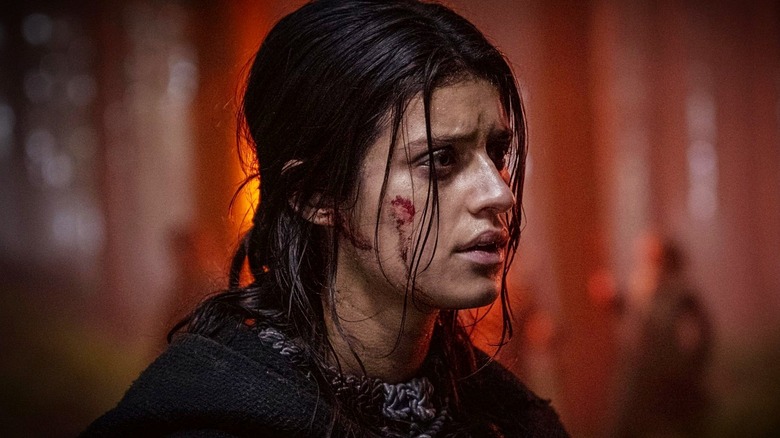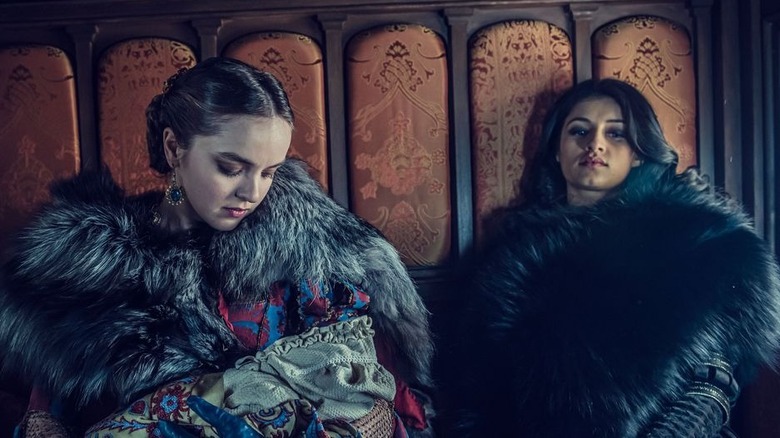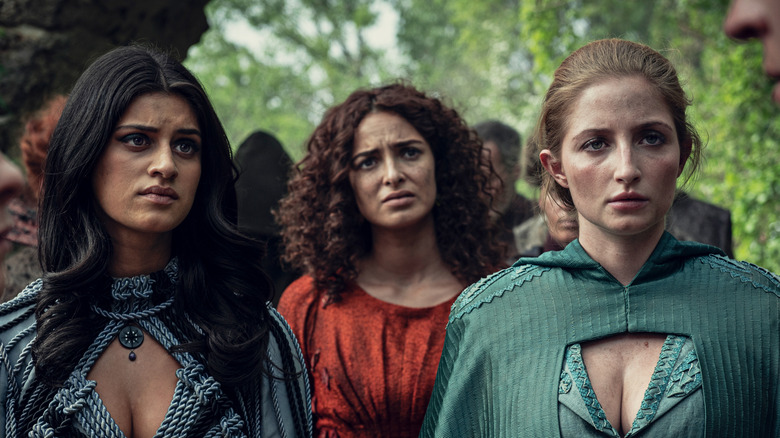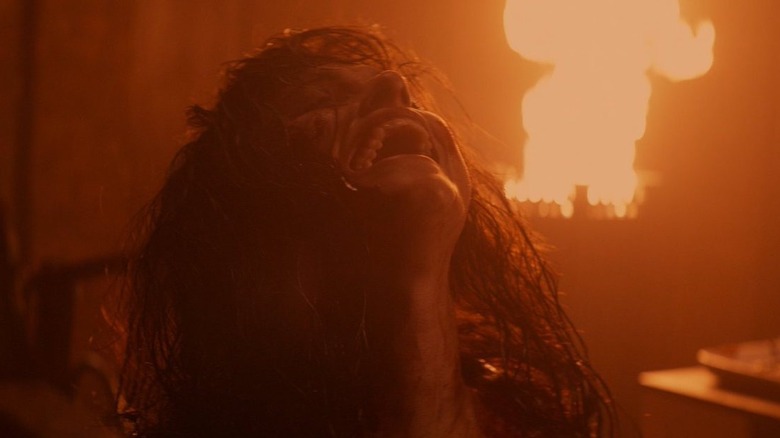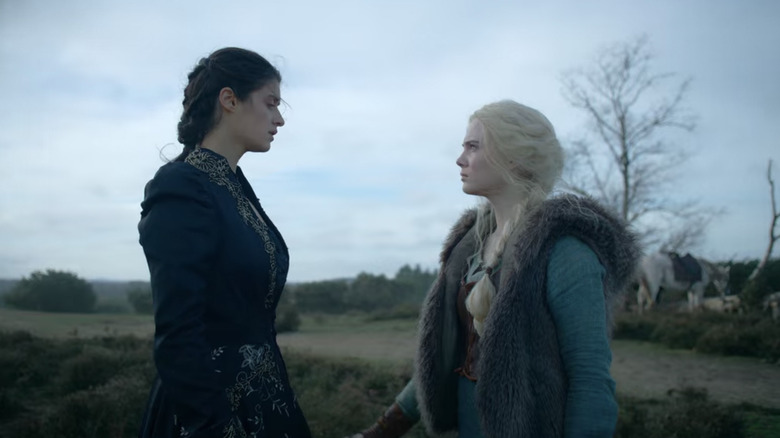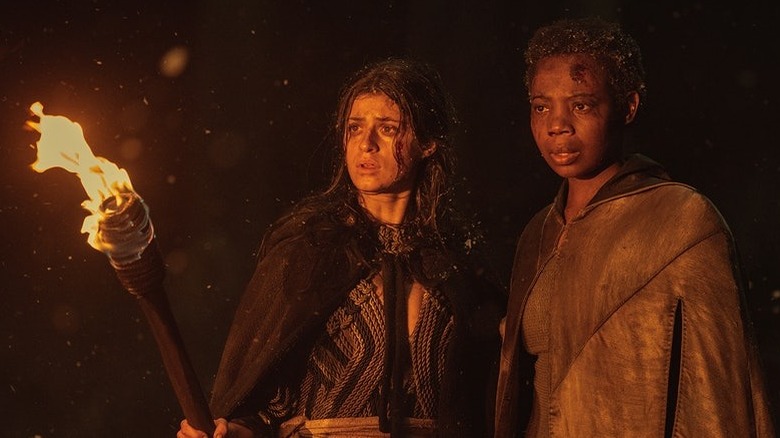Yennefer's Motherhood Storyline In The Witcher Isn't Sexist — It's Empowering
Not too long ago, I binge-watched Netflix's "The Witcher," a fantasy series based on the books by Andrzej Sapkowski and starring Henry Cavill in the titular role. When I went to the internet to see what other people were saying about the show, I found that a fair number of people had harsh words for Yennefer, the powerful sorceress played by Anya Chalotra. No, I'm not talking about that magical orgy scene where the consent of the townspeople is a bit murky. Instead, many fans and critics have been pretty vocal about Yennefer's fertility struggles and her yearning for motherhood, dismissively writing it off as sexist or clichéd.
Because of this, I'm here to defend Yennefer, and by extension the writers behind "The Witcher." Not for that weird orgy she orchestrated, but for her choice to pursue motherhood. Yes, it can potentially come off as sexist to have a powerful woman character like Yennefer yearn for things like beauty and motherhood. But my stance on Yennefer's maternal aspirations is a bit more forgiving than that, and perhaps that stems from my own experiences as a mother.
A Little About Me (I'm Not a Dragon, Sorry)
To understand where I'm coming from, here are some fun facts about me. I had my daughter at 19. I found out I was pregnant two days before high school graduation. I remember my mom asking me if I wanted to proceed with the pregnancy, and I told her I needed to think about it. My daughter is almost 11 years old now, and I do not regret my decision at all.
In fact, despite what cynical media (looking at you, "Vivarium") and the increasingly common internet pastime of patronizing and bashing parents (but mainly mothers) and children for merely existing would have you believe, I enjoy being a mom. My life is not miserable — my daughter sleeps in on the weekends later than I do and is one of the most considerate and interesting people (yes, children are, in fact, people) I know. I haven't had to give up my own identity or sense of self to be a good and effective mom. I still went to college, still pursued (and am pursuing) my goals, and still have plenty of time to enjoy and raise my kid.
Motherhood does come with some challenges, but it's far from the torturous, thankless prison that so many people like to pretend it is. In fact, it's not even the most difficult part of my life — that's an honor reserved for navigating society as a Black woman who doesn't fit into the very narrow view of what many people think a Black woman should be. Yennefer, too, is somewhat of an outsider and rule-breaker within the rules and expectations of the "Witcher" universe.
It's Not Out of Character
One of the main arguments I've seen against Yennefer's desire to experience motherhood and/or restore her ability to give birth is that it's not a natural progression for the character — but in fact it fits perfectly with what we know about Yen. Since escaping her miserable upbringing, she has lived her life in pursuit of power. She wants to have it all, including everything she feels she has been denied. When she becomes disillusioned with her position as a powerful sorceress to nobles, and finds out that physical beauty is a useful but overrated double edged sword, it's natural she'd turn to something she hadn't yet experienced or had access to. In this case, that something was motherhood – or at least the option to experience it.
In the "Witcher" season 1 episode "Rare Species," Yennefer says outright to Geralt that she wants her choice back. At least to some degree, it's not about having a child right then and there, or even having one at all; it's about having the option to. It's not that Yennefer thinks motherhood is the greatest or only value women can have; she simply wants the power to decide for herself. Though she submitted to the transformation ritual at Aretuza, in which her reproductive organs were removed as the price for her initiation, her goal was always to gain agency; the first thing she does with her newly-transformed appearance is use it to catch the eye of a king and win a different royal court appointment than the one she was given.
This is important because Yennefer was never given much choice at all. She came to Aretuza reluctantly after being sold to Tissaia de Vries for four marks. As Geralt points out in "Rare Species," forced sterilization is the standard for magic-wielders and witchers. He also tells Yennefer she wouldn't be a good mother, which is pretty awful, untrue, and — given that Yennefer is a strong-willed individual who has a track record of wanting to prove naysayers wrong — probably only hardened her resolve to have a child.
She knows she is powerful. She knows she has value. None of what makes her a strong, complex character is diminished by wanting the option to be a mom someday, and I certainly don't live the miserable life that weirdos like to project onto single mothers. Like Yennefer, I still have other talents, interests, and pursuits separate from motherhood. My ambition did not disappear just because I gave birth.
Yennefer is clearly an unconventional person in the society that makes up "The Witcher." She rejects the bureaucracy and limitations of the Brotherhood of Sorcerers, and rejects the notion that she has to choose between having power and having a child. Her desire to restore her fertility partially stems from her realization that she was influenced into trading something of great value. It's simply an extension of Yennefer's drive to take back what she has been denied: her "chance to become beautiful;" her power as sorceress and royal advisor; her freedom; and now, her fertility. This isn't out of character, and it's not inherently sexist to depict some women who desire the opportunity to raise children.
It's revealed during her conversation with Istredd in an earlier episode that Yennefer's greatest fear is that she will never be enough for someone to truly love her. Later, following her conversation with a queen in "Of Banquets, Bastards and Burials," who says that she is "the whole world" to her baby, Yennefer seems to latch onto the idea of having a child as a means to finally be enough for someone.
Is it selfish to want to have a kid solely so you can have someone to love and be loved by? I'm not sure how to answer that. Is Yennefer a flawed character who sometimes acts selfishly and doesn't think things through in pursuit of her personal goals? Yup, definitely. I personally do not want perfect characters; I want characters that feel real. Perfection isn't real, and it'd be pretty boring if characters we watch only ever did things we personally understood or agreed with.
It's the Choice That Matters
I'm not unsympathetic to "The Witcher" fans who are put off by Yennefer's yearning. I'm intimately familiar with the way women have historically been depicted as having little value or personal desire outside of being mothers and baby-making factories. I 100% support any woman's decision to be child-free; to have complete and total autonomy over her reproductive health. It should not even be up for debate or discussion that a woman should be able to decide for herself — and only herself — when and if she wants to experience motherhood at all. We should be the only people determining whether or not we are "suited" for motherhood.
There are those who will attack child-free women as selfish, projecting their own fears of leading an unfulfilling life onto perfectly happy individuals. And at the other extreme end of the spectrum there is no shortage of people eager to lambast perfectly happy mothers as miserable failures who traded any chance of freedom or success when they decided to become parents.
I really don't believe that the answer to sexism is internalized misogyny aimed at women whose choices may appear more "traditional" on the surface. And yet the notion that women who have or want children are somehow harmful to feminist causes seems to be a driving force in the criticism of Yennefer's motherhood journey. It's especially unfortunate because this kneejerk response to reject this part of Yennefer's arc overlooks the fact that she pursues motherhood in defiance of a sexist organization that tells her she can be powerful, or she can be a mother, but she cannot be both. It also ignores the ways in which Yennefer's character provides meaningful representation for some viewers.
Rejecting Forced Sterilization & Challenging Expectations
Yennefer's story arc calls into the question the coerced sterilization that takes place in Aretuza. In the show, we learn that the students of the magic academy are all sterilized as part of their schooling and graduation, as though this were a necessary step in becoming a powerful sorceress. However, we also find out that Geralt's biological mother is a sorceress, meaning that sterilization is actually not necessary. The "Witcher" novels go into further detail about this, when Tissaia de Vries reveals that she personally enforces sterilization due to her own beliefs about the supposed incompatibility of motherhood and magic:
"Most of us wizards lose the ability to procreate due to somatic changes and dysfunction of the pituitary gland. Some wizards — usually women — attune to magic while still maintaining efficiency of the gonads. They can conceive and give birth — and have the audacity to consider this happiness and a blessing. But I repeat: no one is born a wizard. And no one should be born one! Conscious of the gravity of what I write, I answer the question posed at the Congress in Cidaris. I answer most emphatically: each one of us must decide what she wants to be — a wizard or a mother. I demand all apprentices be sterilized. Without exception."
While she doesn't outright say these things in the show, the implication is there and even echoed by Geralt when he tells Yennefer that people like them — witchers and magic users — aren't cut out to be parents. Of course, by "The Witcher" season 2 Geralt is eating his words as he learns how to be a father to his own "child of surprise," Ciri. In this way, "The Witcher" not only makes a point that infertility does not preclude having a family; it also challenges the narrative that people can't "have it all," and instead must choose between having a family or pursuing their own destiny.
A prime example of this is Lady Calanthe: mother, grandmother, and badass warrior queen. Calanthe balances her duties as a leader with her duties as a parent, which is far more impressive to me than simply having every powerful character be completely and conveniently free of any conflicting responsibilities. As a mom, I can't help being interested in depictions of motherhood that are more than just "she gave up everything to have a kid, never lived her dreams, or did anything for herself. The end." Besides the obvious sexism, this cliché also ignores the reality of the many people who raise children while still maintaining their own identities, careers, and interests.
Parenthood & Family Were Always the Point
One of "The Witcher's" most obvious, overarching themes is that of families bound by blood, choice, or circumstance, and to dismiss Yennefer's journey to motherhood is also to dismiss one of the best examples of the "chosen family" theme within the show. Yennefer's initial focus on the biological path to motherhood is not really the point. For instance, Geralt's biological mother, who is also a sorceress, abandoned him. Clearly, biology has little to do with one's ability to be a good parent — a point illustrated by numerous characters including Vesemir, Geralt, and of course, Yennefer.
After losing her magic and sense of purpose, Yennefer ends up becoming a maternal figure to Ciri as she is the only person who is able to help her control her powers. While she initially sought out Ciri under false pretenses, having been manipulated by the Deathless Mother, Yennefer comes to value her kinship with Ciri more than the possibility of regaining her magic. Yennefer may not have succeeded in restoring her fertility, but it doesn't mean she can't still be a mother and have a family of her own. With Geralt and Ciri, she forms her own family.
If all of this stood out in stark contrast to the rest of the show, I could understand some of the harsher criticisms — but it doesn't. "The Witcher" season 2 heavily focuses Geralt learning how to be a father and a mentor to Ciri, with guidance from his own paternal figure, Vesemir. Themes of parenthood and family were also prevalent throughout the show's first season with characters other than Yennefer, so it's not as though all those themes were carried solely on her shoulders (which would indeed have been pretty crappy and questionable). Instead, it works because "The Witcher" is a fantasy show that's very much about how familial bonds are influenced by the chaos of the world around them — not unlike the predicament of many people (myself included) who find themselves having to navigate parenthood in the midst of a pandemic and growing civil unrest.
There's Room for More Than One Type of 'Strong Female Character'
It should also go without saying that Yennefer's story also serves as meaningful representation for people who have their own struggles to come to terms with infertility. With that in mind, it's shallow and insensitive to condemn that aspect of her character as harmful or unrealistic; to do so is to disregard the very real people who have dealt with similar situations in favor of one very narrow idea of what a "strong female character" is supposed to look like.
While I do not share that particular experience, I strongly identify with Yennefer's desire to have it all, and to defy anyone and anything that tells her she can't. I have dealt with pressure and preconceived notions from others my entire life — long before I became a mom. I have been told there are certain things I can't or shouldn't do because of aspects of my identity beyond my control: my Blackness, my gender, the fact that I am on the autism spectrum, the fact that I had a kid at 19.
Yennefer, too, was made to feel like she was nothing, and then made to feel like she had to live up to someone else's idea of who she should be in order to live happily. In response, she repeatedly pushed back against whatever didn't suit her, and in the end she has both her magic and a family. Similarly, I rejected everyone else's ideas about what I should do and who I should be as a woman who chose motherhood: I still went to college, and I'm in a happy and loving relationship. I am on a journey towards the fulfilling career I have always dreamed of, while also having the family I always wanted. That's not sexism or an unrealistic fantasy. That's just my life.
Surely there is a happy medium that allows for women to be respectfully depicted as individuals in charge of their own destinies, even if those destinies sometimes include issues like pregnancy, birth, and parenthood? Women should be able to make their own decisions on their own terms, and well-written characters can and should reflect the nuances of this reality. That is why I don't take issue with Yennefer's motherhood character arc. I don't think media representation is a zero-sum game wherein all depictions of women as mothers or desiring motherhood are inherently reductive, sexist, or harmful. It's the execution that matters.
In Yennefer's case, I think those themes were handled well. And if we're going to talk sexism in "The Witcher" universe, the lack of female witchers on the basis of "biological differences" and the asinine notion that girls are just not as "strong" as boys is a far more glaring example – and hopefully we'll see that rule being challenged in the show's future as well.
"The Witcher" seasons 1 and 2 are available now on Netflix.
